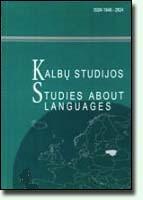Sociokultūrinio konteksto svarba mokant užsieniečius lietuvių kalbos kaip svetimosios
The Importance of Sociokultural Context in Teaching Lithuanian as a Second Language
Author(s): Regina Žukienė, Vaida BuivydienėSubject(s): Language and Literature Studies
Published by: Kauno Technologijos Universitetas
Keywords: foreign language skills; educational and linguistic experience
Summary/Abstract: As Lithuania joined European Union (EU), there is an opportunity to reach a higher level of scientific knowledge. Therefore it is extremely important to use all the chances in communicating with international programs like SOCRATES and ERASMUS. These programs provide the ability to strengthen not only professional competence, but also foreign language skills and understanding different cultures. Every year students and teachers come to universities of Lithuania, so there must exist the best circumstances to achieve cultural, educational and linguistic experience. A lot of foreign students in Lithuania choose to study Lithuanian language. Therefore it is important to organize the studies of Lithuanian language in a way that it would be interesting and useful. The survey has shown that students that come under SOCRATES/ ERASMUS student exchange programme should be introduced more to cultural awareness and competencies than to grammar patterns. There should be more emphasis on teaching functional language. Lithuanian language teachers faced with the lack of modern course books for foreign students that would cater the needs of those students, teaching functional language and introducing to socio cultural issues. Therefore there is strong demand to compile and publish a new updated and modern textbook for Lithuanian language learners. Modern language teaching is the way to socio cultural awareness and teaching cultural values. Teaching culture is one of the most important aspects of Lithuanian language teaching in modern and open society.
Journal: Kalbų Studijos
- Issue Year: 2006
- Issue No: 9
- Page Range: 71-76
- Page Count: 4

